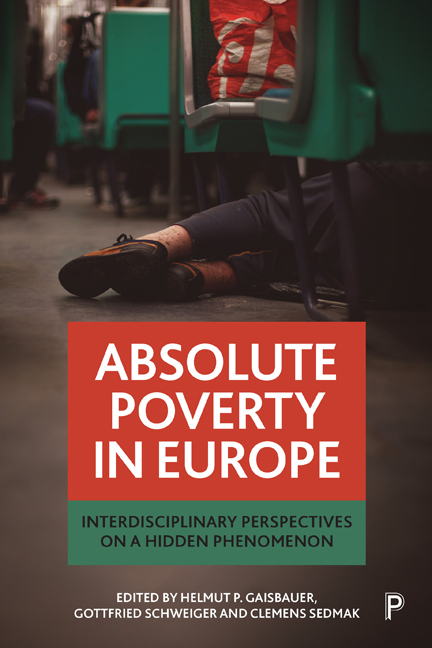Book contents
- Frontmatter
- Contents
- List of figures and tables
- Notes on contributors
- 1 Absolute poverty in Europe: introduction
- Part One Conceptual and methodological challenges
- Part Two Key issues for the absolute poor
- Part Three Policy responses to absolute poverty in Europe
- Part Four Ethical perspectives on absolute poverty in Europe
- Conclusion responding to the dark reality of absolute poverty in European welfare states
- Index
14 - Absolute poverty and the EU Social Policy Agenda
Published online by Cambridge University Press: 27 April 2022
- Frontmatter
- Contents
- List of figures and tables
- Notes on contributors
- 1 Absolute poverty in Europe: introduction
- Part One Conceptual and methodological challenges
- Part Two Key issues for the absolute poor
- Part Three Policy responses to absolute poverty in Europe
- Part Four Ethical perspectives on absolute poverty in Europe
- Conclusion responding to the dark reality of absolute poverty in European welfare states
- Index
Summary
Introduction
The European Council, which took place in Paris on 22 July 1975, agreed upon a European definition of poverty as being the situation of people with insufficient income to have a standard of living considered acceptable in the society in which they live. From that moment, we can observe the beginning of explicit community action to combat poverty (Urquijo, 2017). The European definition, borrowed from the concept of relative poverty, was established and popularised by Peter Townsend (1979). This concept perfectly captures the core idea of the ‘European Social Model’, which is about solidarity ensuring social cohesion and social protection (Streek, 1999). It is based on a normative conception of social justice which implies that nobody should be left behind. Such a conception, in a way, tends to focus on poverty and social exclusion primarily from a perspective of the centre (Castel and Dörre, 2009). This opens up the question of how to deal with the poorest of the poor, who are often out of sight – heuristically, methodologically or politically (Gaisbauer and Sedmak, 2014).
The Treaty of Amsterdam provided a legal basis for antipoverty policies by introducing the eradication of social exclusion as an objective of EU social policy. The Council later stated at the Lisbon Summit that the number of people in poverty in the EU was unacceptable and, accordingly, launched the Social Policy Agenda, setting up the Open Method of Coordination (OMC) and combining national action plans and the initiatives of the Commission to promote cooperation in this field (Urquijo, 2017). Consequently, a new focus on poverty and social exclusion ensued, following a previous social policy dedicated to employment (O’Connor, 2005). Such employment-related focus in antipoverty policies tends to exclude or diminish concerns for the most needy or for people in extreme or absolute poverty. Interestingly, the European Commission has been continually operating programmes for people in extreme or absolute poverty since the 1980s, and regularly had a tendency to include the case for the worst off in the various agendas. Despite such efforts, high-profile developments in the realm of EU social policy tended to lose this particular focus.
- Type
- Chapter
- Information
- Absolute Poverty in EuropeInterdisciplinary Perspectives on a Hidden Phenomenon, pp. 289 - 312Publisher: Bristol University PressPrint publication year: 2019



